2022年中考专题复习:现在完成时综合复习课件(共39张PPT)
文档属性
| 名称 | 2022年中考专题复习:现在完成时综合复习课件(共39张PPT) |  | |
| 格式 | pptx | ||
| 文件大小 | 10.8MB | ||
| 资源类型 | 教案 | ||
| 版本资源 | 通用版 | ||
| 科目 | 英语 | ||
| 更新时间 | 2022-04-22 19:39:09 | ||
图片预览

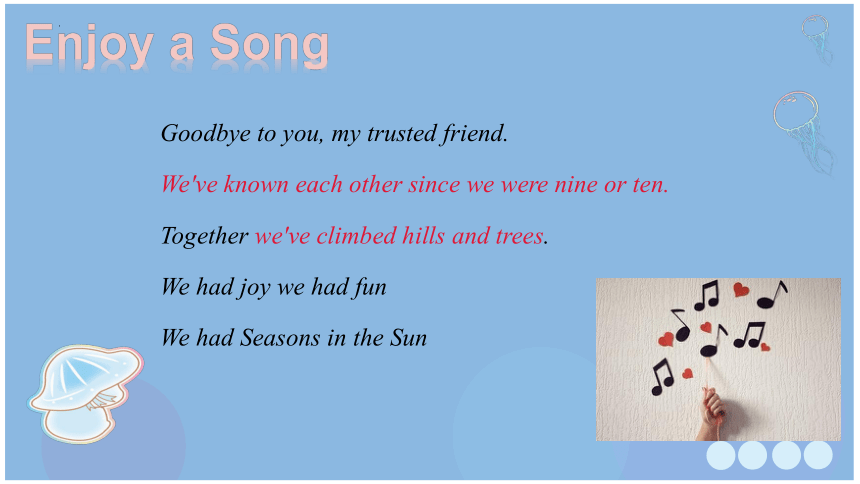
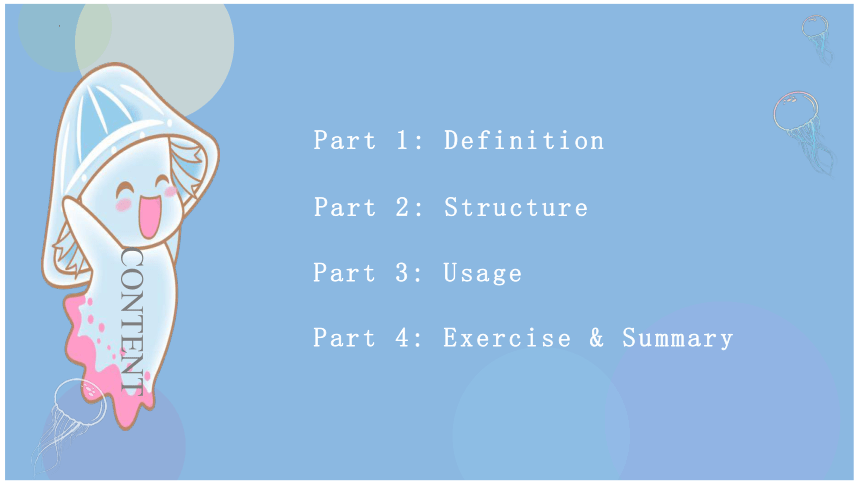
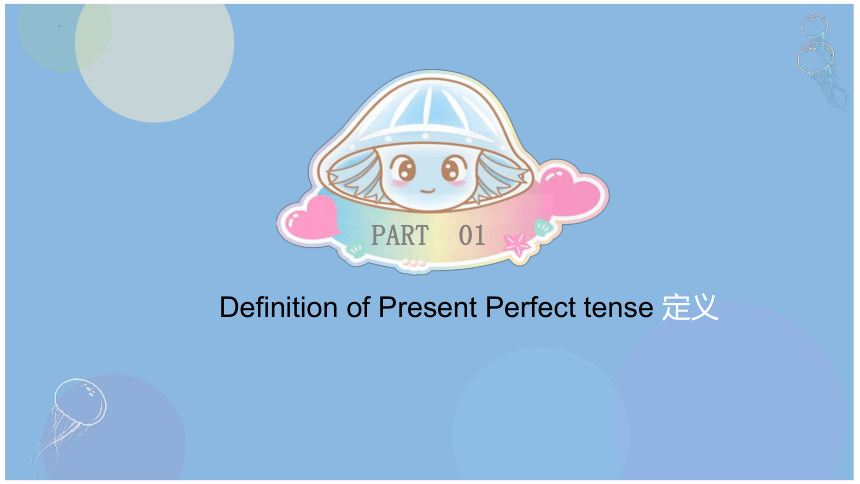

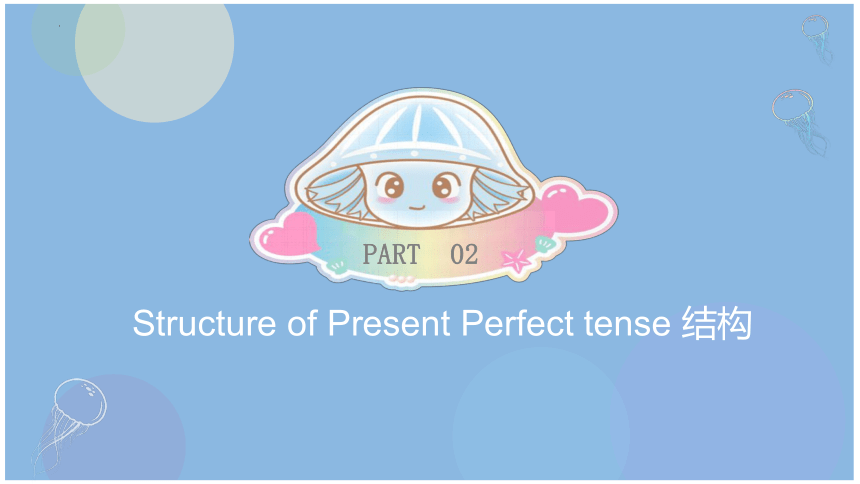
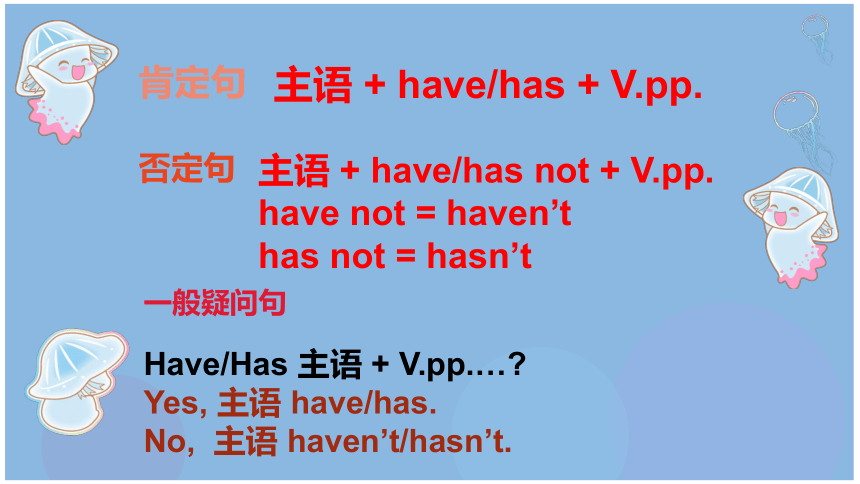
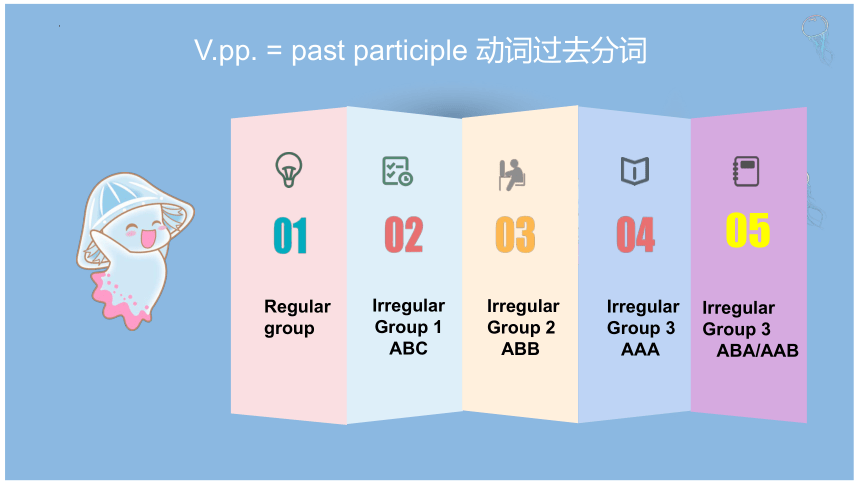
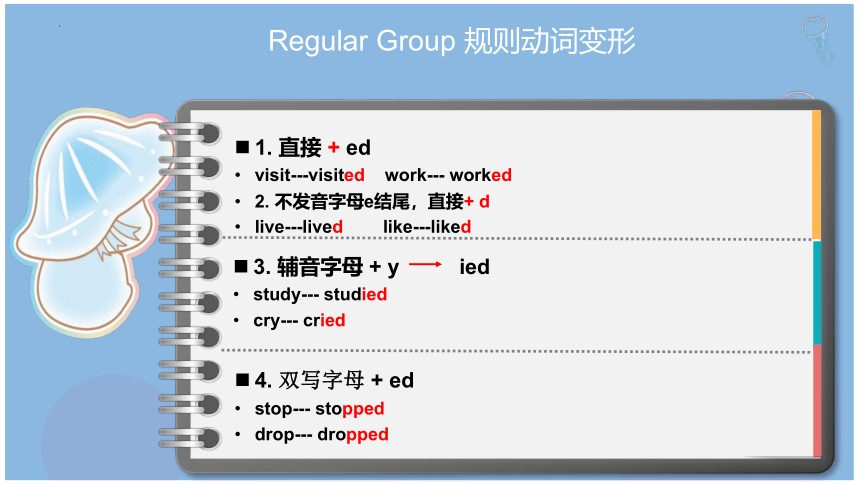
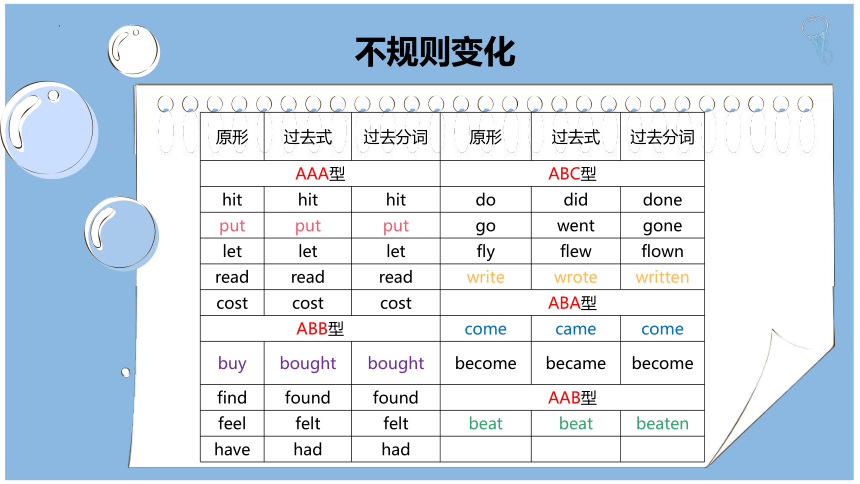
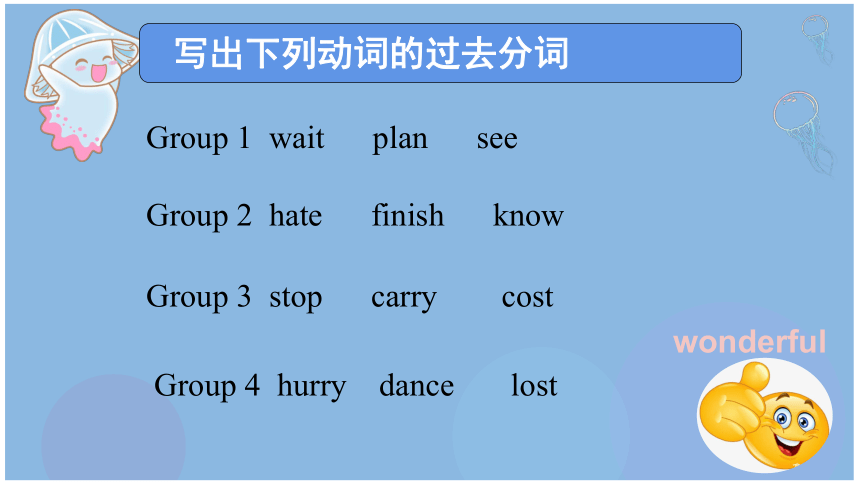
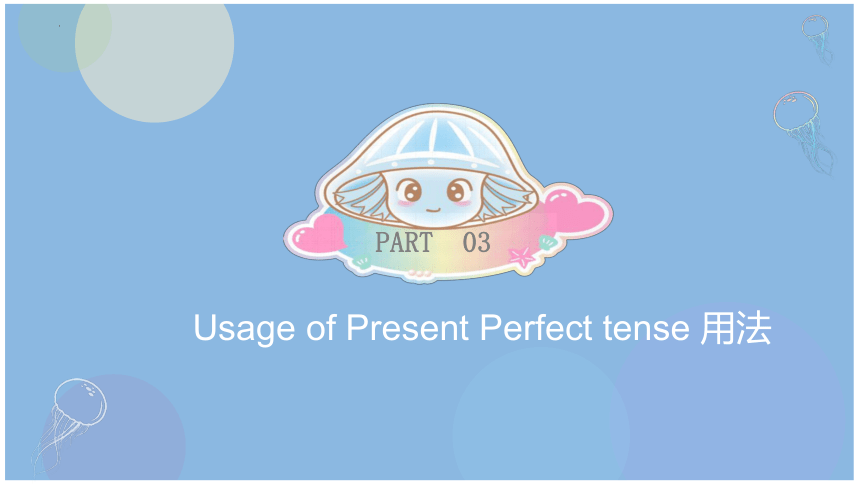
文档简介
(共39张PPT)
中考专题七:
现在完成时
与
过去完成时
Enjoy a Song
Goodbye to you, my trusted friend.
We've known each other since we were nine or ten.
Together we've climbed hills and trees.
We had joy we had fun
We had Seasons in the Sun
Part 1: Definition
CONTENT
Part 2: Structure
Part 3: Usage
Part 4: Exercise & Summary
PART 01
Definition of Present Perfect tense 定义
1、表示动作从过去开始持续到现在,并有可能持续到将来。
2、表示过去发生的动作或事情对现在的影响和产生的结果;它强调的是过去的动作同现在的联系。
They have been away for two years.
My dog Kiki has been with our family since I was 16.
I have just opened the door.
(The door is not closed now.)
PART 02
Structure of Present Perfect tense 结构
主语 + have/has + V.pp.
主语 + have/has not + V.pp.
have not = haven’t
has not = hasn’t
Have/Has 主语 + V.pp.…
Yes, 主语 have/has.
No, 主语 haven’t/hasn’t.
肯定句
否定句
一般疑问句
V.pp. = past participle 动词过去分词
01
02
03
Regular
group
Irregular
Group 1
ABC
Irregular
Group 2
ABB
04
Irregular
Group 3
AAA
Irregular
Group 3
ABA/AAB
05
Regular Group 规则动词变形
4. 双写字母 + ed
stop--- stopped
drop--- dropped
3. 辅音字母 + y ied
study--- studied
cry--- cried
1. 直接 + ed
visit---visited work--- worked
2. 不发音字母e结尾,直接+ d
live---lived like---liked
不规则变化
原形 过去式 过去分词 原形 过去式 过去分词
AAA型 ABC型
hit hit hit do did done
put put put go went gone
let let let fly flew flown
read read read write wrote written
cost cost cost ABA型
ABB型 come came come
buy bought bought become became become
find found found AAB型
feel felt felt beat beat beaten
have had had
Group 2 hate finish know
Group 1 wait plan see
Group 3 stop carry cost
Group 4 hurry dance lost
写出下列动词的过去分词
wonderful
PART 03
Usage of Present Perfect tense 用法
already
已经(肯定句)
yet
已经(一疑句)
还(否定句)
ever
曾经(一疑句)
never
从来不
just
刚刚
so far
到目前为止
I have already read Little Women.
I haven’t read Little Women yet.
Have you read Little Women yet
Have you ever read Little Women
I have never read Little Women.
I have just finished reading Little Women.
I have only planted 100 trees so far.
I have read Robinson Crusoe twice.
twice/其他倍数
两次、几次
Adverbs of time 时间标志词
Practice
Tips: try to judge the types of each sentence like statement, negative or yes-no question
根据句意, 用上一页的时间副词填空:
I have __________________ finished my homework.
He has not begun to work _____.
I have ______ finished my lunch.
Have you _____ been to the park No, ______.
Have you seen the movie _____
She has learned 3000 English words ________.
already/just
yet
just
ever
never
yet
so far
for & since 用法
Step2. Understanding
for
since “自……以后;从……以来”
★ for + 段时间
★ since + 点时间
★ since + 句子(一般过去时).
E.g.
1) I have lived here for more than twenty years.
我在这儿住了二十多年了。
= I have lived here since twenty years ago.(通常可以与“since+过去的时间点”互换使用)
E.g.
1) I have lived here since I was born.
我从出生起就住在这里。
2) I have lived here since twenty years ago.
我在这里住了二十多年了。
since last Friday
since two days ago
since 2000
I have studied English for 20 years.
I have studied English since 20 years ago.
How long have you studied English
Cindy hasn’t called me since she went
to London.
Attention:
现在完成时中,如果有since/for出现,其主句的谓语动词通常是延续性动词。
对since/for引导的状语提问要用how long.
短暂性动词的否定形式可以和since/for搭配使用。
Practice
Attention: try to notice the adverbs of time.
Ms. Li has been in hospital ______ last week.
I have stayed at my aunt’s ______ two weeks.
I’ve known her ______ we were children.
She has been away from Xi’an _____ about ten years.
It’s about ten years ______ she left the city.
The old man has worked in this clinic _______ 1980.
I have been here _______ two o’clock ago.
since
for
since
for
since
since
since
延续性动词Durational Verbs & 短暂性动词Momentary Verbs
Momentary
Verbs
Durational
Verbs
延续性动词表示能够延续的动作词,表示经过,经历。
常与一段时间连用。
短暂性动词也为瞬间动词,表示这种动作发生后就立刻结束。
不能跟一段时间连。
-Can I borrow your book
- Of course. You can borrow it for a month.
keep
Learn & Memorize
延续性与短暂性动词是可以互换的。
①转化为其他动词:
buy→ have, borrow→ keep, become→ be等;
②转化为“be +形容词/副词/介词短语”:
begin/start→ be on die→ be dead
finish→ be over marry→ be married
sleep→ be asleep return→ be back
arrive→ be here leave/go→ be away
close/open→ be closed/open,
Attention: 当句子中有段时间状语时,一定要把短暂性动词换成延续性动词。
T or F
finish/ end be over
join be in
open be opened
buy have
leave away
borrow keep
start/begin be on
marry be marry
be open
be married
be away
arrive/come/go to die
become a borrow be borrowed
Leave/ move
buy open
join be joining
start/begin finish/ end
catch a cold get up
marry be marry get out
close wake up be waked
go to sleep
become interested in
be in
be dead
have
be away / be out
be a
be open
be on
be over
have a cold
be up
be out
be closed
be asleep/ sleep
be interested in
T or F
keep
be in/a member of
be awake
be married
have gone to/ have been to/have been in 区别
For example:
Eddie has been to South Hill many times.
It is very nice and he wants to go there again.
Attention: has been to + 地点表示某人曾去过某地(现已回来),后面常跟次数或者ever等词。
have gone to/ have been to/have been in 区别
Paddington has been to London.
Bye,
London!
Hello,everyone! My name is Paddington Bear.
Attention: has been in + 地点表示某人一直在某地,常跟段时间状语连用。(如果地点是here、there省略in)
Paddington has been in London for a week.
I love London!
have gone to/ have been to/have been in 区别
Paddington has gone to London.
Attention: has gone to + 地点表示某人在去某地途中或到了某地(现在还没有回来)
Hello,
London!
have gone to/ have been to/have been in 区别
-Where is Tom?- He __________ England.
A. has gone to B. has been to
2. A number of tourists _______ Xi’an many times because it is such a beautiful city.
A. have been to B. has been to
C. have gone to D. has gone to
3. Kate ____________ (be) in Shanghai since 2000.
has been
Practice
现在完成时& 一般过去时
Present
Past Tense
Present
Perfect Tense
但现在完成时注意的不是事情本身,而是强调事情与现在保持的某种密切联系(如现在的结果,影响,一直延续到现在等);
而一般过去时,则只讲述发生在过去的动作和事情与现在没有关系。
现在完成时和一般过去时都是说过去的事情
We ________________ each other since we were nine or ten .
We ____________ each other when we were young .
Examples
(know)
have known
knew
I _____ just _____ him twice.
I ________ him just now .
Examples
(see)
have
saw
seen
Have
--______ you _________your bike --Yes, I _______.
--When_______ you _______ it
--I __________ it yesterday.
Examples
(repair)
repaired
have
did
repair
repaired
During 2020’s Spring Festival, people in Wuhan faced a serious disaster--new coronavirus.
A lot of people have pulled together to fight COVID-19 since two years ago.
They are adorable people and need to be respected.
Recently we ________(read) lots of news about the novel coronavirus (新型冠状病毒). The Chinese government has taken active actions _____ (protect) its people as well as those around the world. However, there ________ (be) many more cases outside China since January 13. WHO experts _____ just _____ (visit) Wuhan to discuss the issue with the Chinese side. They say our government _____ already _____ (do) a great job in fighting against the novel coronavirus. China will continue working ____ WHO. We are sure China will be able to control the outbreak. Even miracles(奇迹) ________ (take) a little time. As middle school______ (student), we should try our best to protect ourselves. The best way is to stay at home______wash our hands often. If we have to go out, we must ______(wear) a mask. Remember we are the one who can fill the world with sunshine.
learn . . .
Chllange yourself!
-Where is your sister
- She ________ France and she ________ Paris for two weeks.
A. has been to, has been in B. has gone to, will stay in
C. has been in, has been to D. has stayed in, has gone to
-This is a really old bike.
– Yes, I _____ it for seven years.
A. have had B. have bought
C. bought D. have buy
–Is everyone here today, Jonathan
- No, sir. Mike is absent. He ________ for two days.
A. has fallen ill B. has been ill
C. fell ill D. was ill
My father _______ in a panda protection center for 10 years, so he knows a lot about panda.
A. was working B. is working
C. has worked D. will work
The shop in Wanda Square ________ for six years, but I _______ there so far.
A. has opened, haven’t gone
B. has been open, haven’t been
C. has been open, haven’t gone
D. has been opened, haven’t been
在科学家们的努力下,中国已经能够制造像C919这样的大飞机。
With scientists’ efforts, China has to make big planes like C919.
最近天气变冷,我这些天患上了感冒。
The weather is very cold these days. I ______ a cold for a few days.
have had
been able
mind-map
时间标志词
时态定义
句型结构
have gone to
have been to
have been in
for/since区别
延续动词V.S.瞬间动词
1.过去延续到现在的动作;
2.过去的事情影响了现在
already/ever/yet/just/so far/never/twice等表次数
去了未回
去了又回
待在,停留
have/has+V-ed
have/has not+V-ed
Have/Has+主语+V-ed
Homework
1. Finish the mind map of Present Perfect Tense.
2. Complete exercise in page 69-70
THANKS
中考专题七:
现在完成时
与
过去完成时
Enjoy a Song
Goodbye to you, my trusted friend.
We've known each other since we were nine or ten.
Together we've climbed hills and trees.
We had joy we had fun
We had Seasons in the Sun
Part 1: Definition
CONTENT
Part 2: Structure
Part 3: Usage
Part 4: Exercise & Summary
PART 01
Definition of Present Perfect tense 定义
1、表示动作从过去开始持续到现在,并有可能持续到将来。
2、表示过去发生的动作或事情对现在的影响和产生的结果;它强调的是过去的动作同现在的联系。
They have been away for two years.
My dog Kiki has been with our family since I was 16.
I have just opened the door.
(The door is not closed now.)
PART 02
Structure of Present Perfect tense 结构
主语 + have/has + V.pp.
主语 + have/has not + V.pp.
have not = haven’t
has not = hasn’t
Have/Has 主语 + V.pp.…
Yes, 主语 have/has.
No, 主语 haven’t/hasn’t.
肯定句
否定句
一般疑问句
V.pp. = past participle 动词过去分词
01
02
03
Regular
group
Irregular
Group 1
ABC
Irregular
Group 2
ABB
04
Irregular
Group 3
AAA
Irregular
Group 3
ABA/AAB
05
Regular Group 规则动词变形
4. 双写字母 + ed
stop--- stopped
drop--- dropped
3. 辅音字母 + y ied
study--- studied
cry--- cried
1. 直接 + ed
visit---visited work--- worked
2. 不发音字母e结尾,直接+ d
live---lived like---liked
不规则变化
原形 过去式 过去分词 原形 过去式 过去分词
AAA型 ABC型
hit hit hit do did done
put put put go went gone
let let let fly flew flown
read read read write wrote written
cost cost cost ABA型
ABB型 come came come
buy bought bought become became become
find found found AAB型
feel felt felt beat beat beaten
have had had
Group 2 hate finish know
Group 1 wait plan see
Group 3 stop carry cost
Group 4 hurry dance lost
写出下列动词的过去分词
wonderful
PART 03
Usage of Present Perfect tense 用法
already
已经(肯定句)
yet
已经(一疑句)
还(否定句)
ever
曾经(一疑句)
never
从来不
just
刚刚
so far
到目前为止
I have already read Little Women.
I haven’t read Little Women yet.
Have you read Little Women yet
Have you ever read Little Women
I have never read Little Women.
I have just finished reading Little Women.
I have only planted 100 trees so far.
I have read Robinson Crusoe twice.
twice/其他倍数
两次、几次
Adverbs of time 时间标志词
Practice
Tips: try to judge the types of each sentence like statement, negative or yes-no question
根据句意, 用上一页的时间副词填空:
I have __________________ finished my homework.
He has not begun to work _____.
I have ______ finished my lunch.
Have you _____ been to the park No, ______.
Have you seen the movie _____
She has learned 3000 English words ________.
already/just
yet
just
ever
never
yet
so far
for & since 用法
Step2. Understanding
for
since “自……以后;从……以来”
★ for + 段时间
★ since + 点时间
★ since + 句子(一般过去时).
E.g.
1) I have lived here for more than twenty years.
我在这儿住了二十多年了。
= I have lived here since twenty years ago.(通常可以与“since+过去的时间点”互换使用)
E.g.
1) I have lived here since I was born.
我从出生起就住在这里。
2) I have lived here since twenty years ago.
我在这里住了二十多年了。
since last Friday
since two days ago
since 2000
I have studied English for 20 years.
I have studied English since 20 years ago.
How long have you studied English
Cindy hasn’t called me since she went
to London.
Attention:
现在完成时中,如果有since/for出现,其主句的谓语动词通常是延续性动词。
对since/for引导的状语提问要用how long.
短暂性动词的否定形式可以和since/for搭配使用。
Practice
Attention: try to notice the adverbs of time.
Ms. Li has been in hospital ______ last week.
I have stayed at my aunt’s ______ two weeks.
I’ve known her ______ we were children.
She has been away from Xi’an _____ about ten years.
It’s about ten years ______ she left the city.
The old man has worked in this clinic _______ 1980.
I have been here _______ two o’clock ago.
since
for
since
for
since
since
since
延续性动词Durational Verbs & 短暂性动词Momentary Verbs
Momentary
Verbs
Durational
Verbs
延续性动词表示能够延续的动作词,表示经过,经历。
常与一段时间连用。
短暂性动词也为瞬间动词,表示这种动作发生后就立刻结束。
不能跟一段时间连。
-Can I borrow your book
- Of course. You can borrow it for a month.
keep
Learn & Memorize
延续性与短暂性动词是可以互换的。
①转化为其他动词:
buy→ have, borrow→ keep, become→ be等;
②转化为“be +形容词/副词/介词短语”:
begin/start→ be on die→ be dead
finish→ be over marry→ be married
sleep→ be asleep return→ be back
arrive→ be here leave/go→ be away
close/open→ be closed/open,
Attention: 当句子中有段时间状语时,一定要把短暂性动词换成延续性动词。
T or F
finish/ end be over
join be in
open be opened
buy have
leave away
borrow keep
start/begin be on
marry be marry
be open
be married
be away
arrive/come/go to die
become a borrow be borrowed
Leave/ move
buy open
join be joining
start/begin finish/ end
catch a cold get up
marry be marry get out
close wake up be waked
go to sleep
become interested in
be in
be dead
have
be away / be out
be a
be open
be on
be over
have a cold
be up
be out
be closed
be asleep/ sleep
be interested in
T or F
keep
be in/a member of
be awake
be married
have gone to/ have been to/have been in 区别
For example:
Eddie has been to South Hill many times.
It is very nice and he wants to go there again.
Attention: has been to + 地点表示某人曾去过某地(现已回来),后面常跟次数或者ever等词。
have gone to/ have been to/have been in 区别
Paddington has been to London.
Bye,
London!
Hello,everyone! My name is Paddington Bear.
Attention: has been in + 地点表示某人一直在某地,常跟段时间状语连用。(如果地点是here、there省略in)
Paddington has been in London for a week.
I love London!
have gone to/ have been to/have been in 区别
Paddington has gone to London.
Attention: has gone to + 地点表示某人在去某地途中或到了某地(现在还没有回来)
Hello,
London!
have gone to/ have been to/have been in 区别
-Where is Tom?- He __________ England.
A. has gone to B. has been to
2. A number of tourists _______ Xi’an many times because it is such a beautiful city.
A. have been to B. has been to
C. have gone to D. has gone to
3. Kate ____________ (be) in Shanghai since 2000.
has been
Practice
现在完成时& 一般过去时
Present
Past Tense
Present
Perfect Tense
但现在完成时注意的不是事情本身,而是强调事情与现在保持的某种密切联系(如现在的结果,影响,一直延续到现在等);
而一般过去时,则只讲述发生在过去的动作和事情与现在没有关系。
现在完成时和一般过去时都是说过去的事情
We ________________ each other since we were nine or ten .
We ____________ each other when we were young .
Examples
(know)
have known
knew
I _____ just _____ him twice.
I ________ him just now .
Examples
(see)
have
saw
seen
Have
--______ you _________your bike --Yes, I _______.
--When_______ you _______ it
--I __________ it yesterday.
Examples
(repair)
repaired
have
did
repair
repaired
During 2020’s Spring Festival, people in Wuhan faced a serious disaster--new coronavirus.
A lot of people have pulled together to fight COVID-19 since two years ago.
They are adorable people and need to be respected.
Recently we ________(read) lots of news about the novel coronavirus (新型冠状病毒). The Chinese government has taken active actions _____ (protect) its people as well as those around the world. However, there ________ (be) many more cases outside China since January 13. WHO experts _____ just _____ (visit) Wuhan to discuss the issue with the Chinese side. They say our government _____ already _____ (do) a great job in fighting against the novel coronavirus. China will continue working ____ WHO. We are sure China will be able to control the outbreak. Even miracles(奇迹) ________ (take) a little time. As middle school______ (student), we should try our best to protect ourselves. The best way is to stay at home______wash our hands often. If we have to go out, we must ______(wear) a mask. Remember we are the one who can fill the world with sunshine.
learn . . .
Chllange yourself!
-Where is your sister
- She ________ France and she ________ Paris for two weeks.
A. has been to, has been in B. has gone to, will stay in
C. has been in, has been to D. has stayed in, has gone to
-This is a really old bike.
– Yes, I _____ it for seven years.
A. have had B. have bought
C. bought D. have buy
–Is everyone here today, Jonathan
- No, sir. Mike is absent. He ________ for two days.
A. has fallen ill B. has been ill
C. fell ill D. was ill
My father _______ in a panda protection center for 10 years, so he knows a lot about panda.
A. was working B. is working
C. has worked D. will work
The shop in Wanda Square ________ for six years, but I _______ there so far.
A. has opened, haven’t gone
B. has been open, haven’t been
C. has been open, haven’t gone
D. has been opened, haven’t been
在科学家们的努力下,中国已经能够制造像C919这样的大飞机。
With scientists’ efforts, China has to make big planes like C919.
最近天气变冷,我这些天患上了感冒。
The weather is very cold these days. I ______ a cold for a few days.
have had
been able
mind-map
时间标志词
时态定义
句型结构
have gone to
have been to
have been in
for/since区别
延续动词V.S.瞬间动词
1.过去延续到现在的动作;
2.过去的事情影响了现在
already/ever/yet/just/so far/never/twice等表次数
去了未回
去了又回
待在,停留
have/has+V-ed
have/has not+V-ed
Have/Has+主语+V-ed
Homework
1. Finish the mind map of Present Perfect Tense.
2. Complete exercise in page 69-70
THANKS
同课章节目录
- 词法
- 名词
- 动词和动词短语
- 动词语态
- 动词时态
- 助动词和情态动词
- 非谓语动词
- 冠词
- 代词
- 数词和量词
- 形容词副词及其比较等级
- 介词和介词短语
- 连词和感叹词
- 构词法
- 相似、相近词比较
- 句法
- 陈述句
- 一般疑问句和否定疑问句
- 特殊疑问句及选择疑问句
- 反意疑问句
- 存在句(There be句型)
- 宾语从句
- 定语从句
- 状语从句
- 主谓一致问题
- 简单句
- 并列句
- 复合句
- 主谓一致
- 主、表语从句
- 名词性从句
- 直接引语和间接引语
- 虚拟语气
- 感叹句
- 强调句
- 倒装句
- 祈使句
- 句子的成分
- 句子的分类
- 题型专区
- 单项选择部分
- 易错题
- 完形填空
- 阅读理解
- 词汇练习
- 听说训练
- 句型转换
- 补全对话
- 短文改错
- 翻译
- 书面表达
- 任务型阅读
- 语法填空
- 其他资料
